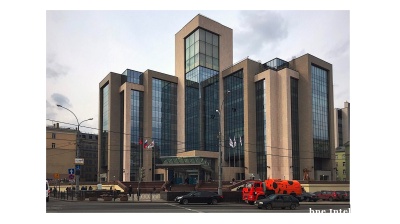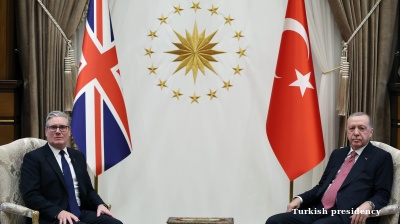Hungarian Prime Minister Viktor Orban blasted the European Union in a keynote speech on July 22 for pushing federalism and embracing migration and LGBT rights, while speaking highly of China as the emerging new global power. Hungary’s strongman also triggered sharp criticism from his V4 ally Czechia by saying that Prague has "switched sides" in the EU federalism debate.
Orban’s minivan entered the festival’s gate in the small Romanian town of Baile Tusnad surrounded by a handful of Romanian nationalists protestors waiving flags and chanting that Transylvania, home to a large ethnic Hungarian minority, is Romanian land, something that is disputed by Hungarian radicals.
The ruling radical rightwing Fidesz has organised the summer university for the 28th year in the picturesque Transylvanian region that features panel discussions during the day and concerts at night. At the onset, it was aimed at forging a dialogue with its neighbour to improve strained ties over the rights of ethnic Hungarians in Romania. In recent years, it has become a meeting point of Fidesz's political and cultural elite. Orban’s speech marks the closure of the gathering, where he tries to give the audience a geopolitical big picture and lay out a long-term vision.
Orban tried to downplay an unprecedented démarche he received from the Romanian Foreign Ministry on the topics that he should refrain from as his speech last year was marred by racist comments, triggering an international uproar. According to Orban, he was told to steer clear from topics that could offend the sensitivity of Romanians.
"The document suggested that I should avoid mentioning "territorial or administrative areas that are non-existent in Romania", Orban said. "They might mean Transylvania and Szekler Land (with a large homogenous ethnic Hungarian population) by that, although we never said they were Romanian territorial units, the prime minister said, flirting with the ideology of some Hungarian nationalists that still disputes the rights of Romania over Transylvania.
He continued: "I was told I could speak of Western values, but 'I shouldn't show them in a bad light'. Nowadays, Western values mean migration, LGBTQ and war, and I won't need to show them in a bad light: they seem bad anyway," he added.
Romania has currently chosen a new prime minister, who will be his 20th partner, he jokingly noted and concluded that Romania’s accession to Schengen will be a priority of Hungary's presidency in the second half of 2024.
Balance of power shifting to China
In his address, Orban highlighted that the balance of power globally has shifted and the current global political trends. Whether they be economic, technological development or military power, they favour Asia and China, Orban asserted.
"China stands before us in full superpower attire. It has a civilisational creed, seeing itself as the centre of the universe, it has a long-term plan to make China great again, as well as a medium-term programme to restore the dominance it had in Asia before the West got there," Orban argued.
He expressed concern about an imminent collision between the two superpowers but was confident that a confrontation between China and the United States was avoidable and that a "war was not inevitable".
Far-right conspiracy theories
The prime minister then moved on to his "favourite topic", according to local commentators, to bash the EU saying it was: "a rich and weak union which sees a rebellious world around itself, confused noise, old grievances, many mouths to feed and massive consumption".
He compared the bloc to an ageing boxing champion who showed off his championship belts but no longer wanted to get back into the ring. This has, led to the EU shutting itself into "an economic, political and cultural ghetto".
Orban devoted a long part of his speech to Hungary's Fundamental Law, approved in 2012, which "distinguishes the country the most from other EU member states".
He went back to recite old clichés and conspiracy theories often debunked, saying that the EU rejected its Christian heritage and that European elites are actively organising the replacement of the European population through migration and "leading a crusade against family-friendly European nations".
He said a political class had emerged in Europe which had no accountability, had no Christian or democratic convictions.
Orban remained adamant that his government will not compromise on such issues as changing the controversial LGBT regulation and will not give in to either political or financial blackmail, he said.
The prime minister continued to criticise EU sanctions, claiming it has led to rising energy prices and did little to weaken Russia.
EU policymakers believe that the sanctions have disconnected the Russian economy from the EU, he said, adding that Russia cannot, however, be cut off from the rest of the world, and in the meantime, the EU is losing competitiveness and suffering from inflation, he said.
Prior to the war, the EU paid €300bn for its gas and oil imports, while last year it paid €653bn and only 8.5% of the 1,400 biggest Western companies have pulled out of Russia, he noted.
To the surprise of many observers, the Hungarian prime minister refrained from giving his insights on the war in Ukraine and on internal struggles in Russia after the failed coup attempt of Wagner leader Yevgeny Prigozhin.
Federalists vs "sovereignists"
Orban then went on to accuse federalists of wanting to overthrow the government in the 2022 elections and finance the opposition, and claimed that federalists had "launched an attack against the Visegrad Group".
"We can all see the result: the Czechs have essentially joined [the federalists], Slovakia is teetering, and only the Poles and the Hungarians are holding out,"he said.
Orban said there was a chance for the number of "sovereignist" countries to grow ahead of the EP elections, noting that such a government had been formed in Italy. "Something is also moving in Austria, and there's an election tomorrow (July 23) in Spain," he added.
Czech Prime Minister Petr Fiala responded swiftly to comments of his his Hungarian counterpart by saying that Czechia is a sovereign state, and its government is protecting the interests of the nation.
"We decide independently what we promote, support or want to change within the European Union. Absurd stigmatisations will certainly not contribute to the necessary cooperation of central European countries. On the contrary, that requires mutual respect," Fiala noted.
Orban said he was hopeful that next year's European Parliament elections would yield "a balance of power in Europe that is “more favourable” for Budapest, which has been one of the pioneers against the EU’s federalist aspirations. In that regard, Hungary has lost a key ally in the UK, he noted.
Orban on economy: worst is over
At the end of his speech, Orban turned to domestic issues with a focus on the Hungarian economy, saying that Hungary has left the worst behind and inflation is expected to fall into single digits by year-end.
He said the government is fighting to get the Hungarian economy back on a growth path in the wake of the two "meteoric crises" in recent years, the pandemic and the war in Ukraine.
As his critics point out, the Hungarian prime minister tends to take credit favourable external developments outside his reach, while shifting the blame to external forces for some misguided policy actions.
He highlighted positive results of the last 12 years, saying the economy’s output had tripled over the last 13 years [in forint terms, only] growing from HUF27 trillion to HUF80 trillion and by 2030 the target is to reach HUF160 trillion.
Analysts point out that in euro terms, Hungary’s economy expanded by only 60% between 2010 and 2022, lagging behind its regional peers.
Per capita GDP rose from 66% of the EU average to 78% in the same period, and the goal was to reach the 85-90% range by 2030.
The plan is also to reduce Hungary's dependence on energy imports to zero from 28% with the construction of the Paks 2 nuclear power plant and its solar energy developments. Hungary would spend a total of HUF11.5 trillion to achieve that, he added.
Orban said that Hungary could achieve this recovery by July 2024 and then a year from now at the next summer camp he can talk about his government’s vision for the 2030-2040 period.
Opposition parties have slammed the prime minister's keynote speech, saying it had failed to offer answers on the challenges of everyday life of Hungarians, who are facing recession and the highest inflation in the EU.
Green LMP said the country’s economic plight is rooted in the "fundamentally flawed economic policy" that exposed the country to Russian energy and Western capital simultaneously and it would be a mistake of historic proportions to "add Chinese industry to our dependencies through battery colonisation".
News

Russia's Lukoil to sell international assets as a result of new US oil sanctions
Russia's second-largest oil producer, the privately owned Lukoil, will sell its international assets as a result of the new oil sanctions imposed by US President Donald Trump last week.

Awkward timing as British PM Starmer arrives in Turkey to sign jet deal on day Erdogan rival is arrested amid UK espionage claims
“Turkish democracy is the casualty of Europe’s rediscovery of Turkey’s strategic value,” columnist writes.

Whistle blown on hundreds of Turkish football referees with betting accounts
Investigation finds 42 gambled on more than 1,000 matches each.
Category 5 hurricane Melissa bears down on Jamaica with Haiti and Cuba in storm's path
A catastrophic Category 5 hurricane was bearing down on Jamaica on Monday, October 27 afternoon with sustained winds of up to 282kph (175mph), threatening to become the strongest storm the Caribbean island has ever experienced.
.jpg)



